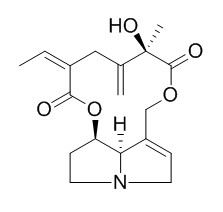Seneciphylline
Seneciphylline, one of the hepatotoxic pyrolizidine alkaloids, has mutagenic activity in Drosophila and their transfer into rat milk.Seneciphylline can significantly increased the activities of epoxide hydrase and glutathione-S-transferase but cause reduction of cytochrome P-450 and related monooxygenase activities.
Inquire / Order:
manager@chemfaces.com
Technical Inquiries:
service@chemfaces.com
Tel:
+86-27-84237783
Fax:
+86-27-84254680
Address:
1 Building, No. 83, CheCheng Rd., Wuhan Economic and Technological Development Zone, Wuhan, Hubei 430056, PRC
Providing storage is as stated on the product vial and the vial is kept tightly sealed, the product can be stored for up to
24 months(2-8C).
Wherever possible, you should prepare and use solutions on the same day. However, if you need to make up stock solutions in advance, we recommend that you store the solution as aliquots in tightly sealed vials at -20C. Generally, these will be useable for up to two weeks. Before use, and prior to opening the vial we recommend that you allow your product to equilibrate to room temperature for at least 1 hour.
Need more advice on solubility, usage and handling? Please email to: service@chemfaces.com
The packaging of the product may have turned upside down during transportation, resulting in the natural compounds adhering to the neck or cap of the vial. take the vial out of its packaging and gently shake to let the compounds fall to the bottom of the vial. for liquid products, centrifuge at 200-500 RPM to gather the liquid at the bottom of the vial. try to avoid loss or contamination during handling.
Phytother Res.2022, 10.1002:ptr.7592.
Int. J. of Pha. and Phy. Res.2015, 7(1):144-149
Kor. J. Herbol.2022, 37(5): 89-96.
Mediators Inflamm.2016, 2016:7216912
Nutrients2020, 12(2):488
Acta Pharm Sin B.2024, 14(4):1772-1786.
Planta Med.2022, a-1876-3009.
Appl. Sci.2023, 13(17), 9653.
Horticulturae2020, 6(4),76.
J Biomol Struct Dyn.2024, 1-12.
Related and Featured Products
J Ethnopharmacol. 1984 Dec;12(3):271-8.
Effect of seneciphylline and senecionine on hepatic drug metabolizing enzymes in rats.[Pubmed:
6533413]
METHODS AND RESULTS:
The effect of oral administration of the pyrrolizidine alkaloids, Seneciphylline and senecionine, from Senecio vulgaris (Compositae) on activities of hepatic epoxide hydrase, glutathione-S-transferase, aminopyrine-N-demethylase and arylhydrocarbon hydroxylase (AHH) was investigated in microsomes of young male albino rats. Seneciphylline significantly increased the activities of epoxide hydrase and glutathione-S-transferase but caused reduction of cytochrome P-450 and related monooxygenase activities. Senecionine failed to stimulate epoxide hydrase while it diminished the activities of glutathione-S-transferase, aminopyrine demethylase and AHH.
CONCLUSIONS:
Seneciphylline and senecionine could not produce any prominent in vitro effect on the hepatic drug metabolizing enzymes under study, except slight stimulation of epoxide hydrase activity by both the alkaloids and slight reduction of aminopyrine demethylase activity by senecionine.
Experientia, 1977, 33(4):498-9.
Hypertrophy of pulmonary arteries and arterioles with cor pulmonale in rats induced by seneciphylline, a pyrrolizidine alkaloid.[Reference:
WebLink]
METHODS AND RESULTS:
Seneciphylline, one of the hepatotoxic pyrolizidine alkaloids, induced, as do also monoclotaline, etc., a marked arterial and arteriolar hypertrophy of the lung of young Wistar rats a month after a single s. c. injection of 50–80 mg/kg. Cor pulmonale with leftward shift of the ventricular septum was also noted.
Toxicol Lett. 1981 Jun-Jul;8(4-5):217-22.
Effects of the pyrrolizidine alkaloids senecionine, retrorsine and seneciphylline on aminopyrine N-demethylase activity on the rat liver S-10 fraction.[Pubmed:
7268806]
The effects of individual pyrrolizidine alkaloids on the mixed-function oxidase (MFO) enzyme aminopyrine N-demethylase were determined in rat liver 10 000 X g supernatant.
METHODS AND RESULTS:
The pyrrolizidine alkaloids, senecionine, Seneciphylline and retrorsine were obtained from Senecio vulgaris. Senecionine and Seneciphylline were found to be linear mixed-type inhibitors while retrorsine was found to be a competitive inhibitor of aminopyrine N-demethylase. The average Ki's +/- S.E. for senecionine, Seneciphylline and retrorsine were 0.18 +/- 0.02, 0.33 +/- 0.06 and 0.92 +/- 0.05 mM, respectively.
J Chem Ecol. 2014 Jun;40(6):609-16.
Toxicity of pyrrolizidine alkaloids to Spodoptera exigua using insect cell lines and injection bioassays.[Pubmed:
24981118]
Pyrrolizidine alkaloids (PAs) are feeding deterrents and toxic compounds to generalist herbivores. Among the PAs of Jacobaea vulgaris Gaertn, jacobine and erucifoline are the most effective against insect herbivores as indicated by correlative studies.
METHODS AND RESULTS:
Because little is known about the effect of jacobine and erucifoline as individual PAs, we isolated these compounds from their respective Jacobaea chemotypes. These PAs and other commercially available senecionine-like PAs, including senecionine, Seneciphylline, retrorsine, and senkirkine, were tested as free base and N-oxide forms at a range of 0-70 ppm. Feeding bioassays using live insects are closer to the natural pattern but require relatively large amounts of test compounds. We, therefore, compared the toxicity of PAs using both Spodoptera exigua cell line and larval injection bioassays. Both bioassays led to similar results in the order of PA toxicity, indicating that the cell lines are a valuable tool for a first toxicity screen. Testing individual PAs, jacobine and erucifoline were the most toxic PAs, suggesting their major role in plant defense against generalist herbivores. Senkirkine and Seneciphylline were less toxic than jacobine and erucifoline but more toxic than retrorsine. Senecionine was not toxic at the tested concentrations. For all toxic PAs, the free base form was more toxic than the N-oxide form.
CONCLUSIONS:
Our results demonstrate that structural variation of PAs influences their effectiveness in plant defense.



